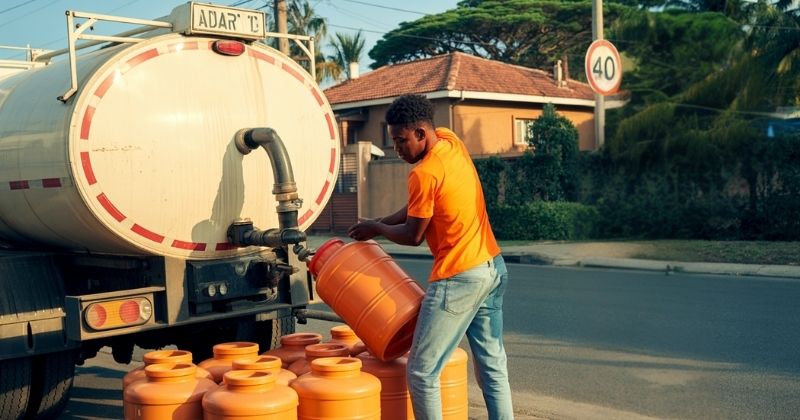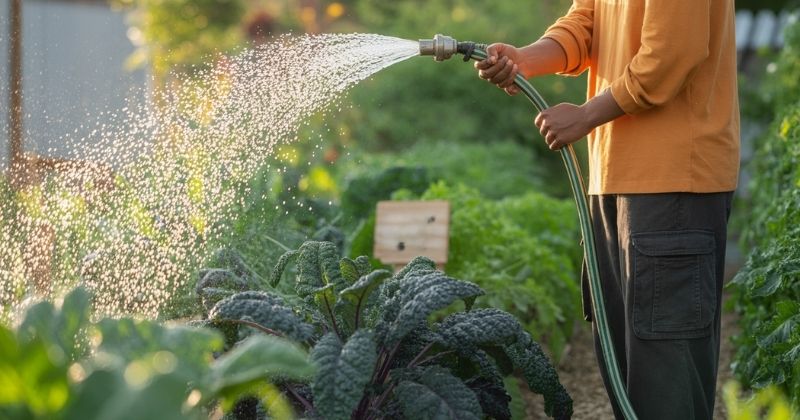
The Department of Cooperative Governance and Traditional Affairs (CoGTA) has taken responsibility for nearly half a billion rand in water service projects that were originally assigned to 21 municipalities unable to meet their basic obligations. These municipalities failed to deliver reliable water services to their communities, prompting national government intervention. This sweeping move represents a rare but necessary override of municipal authority, highlighting just how widespread and entrenched the dysfunction within local governance has become.
Key Takeaways
- CoGTA Assumes Control of Failing Municipal Projects: The Department of Cooperative Governance and Traditional Affairs has taken over R494 million worth of water infrastructure projects from 21 underperforming municipalities, due to chronic mismanagement and failure to deliver basic water services.
- National Water Losses Remain Critically High: South Africa continues to lose nearly half of its municipal water supply through leaks and inefficiencies, with non-revenue water losses reaching 47.4% and pipe leakages alone accounting for 40.8% of this figure.
- Widespread Municipal Underperformance Exposed: The No Drop Report shows that over half of Water Service Authorities performed poorly or failed to submit data, highlighting systemic governance failures, lack of capacity, and worsening infrastructure decay.
About Arcadia Finance
Need a loan? Arcadia Finance connects you with 10 reputable, NCR-registered lenders: no application fees, no hassle, just trusted options.
This shift in responsibility was confirmed by CoGTA Minister Velenkosini Hlabisa in a formal written reply to questions posed in Parliament by Inkosi Buthelezi, a Member of Parliament representing the Inkatha Freedom Party (IFP). The response marks one of the Minister’s first decisive steps to confront the water service crisis through direct administrative control.
Minister Hlabisa disclosed that the affected municipalities were identified based on serious technical shortcomings in their capacity to provide water services. These shortcomings were flagged in various Drop Reports and through directives issued by the Department of Water and Sanitation (DWS), revealing significant failures in local governance and service delivery. In some areas, residents have gone without consistent water supply for extended periods, despite ongoing national infrastructure grants being allocated to the municipalities.
R494 Million in Grant Funds Reallocated to CoGTA Control
The total amount of funding that has been reallocated from these municipalities’ budgets sits at approximately R494 million. This money was initially part of the regular schedule 5B Municipal Infrastructure Grant (MIG) for the 2025/26 financial year. Due to the poor performance of the municipalities involved, the funding has now been transferred to an indirect schedule 6B grant, placing full project implementation responsibilities in CoGTA’s hands. These funds will now bypass local officials entirely, with CoGTA managing procurement, planning, and delivery in an attempt to eliminate the administrative paralysis that has blocked previous interventions.
With this adjustment, CoGTA has been formally authorised to oversee and implement the necessary water services infrastructure projects on behalf of the failing municipalities. The minister explained that this intervention aims to improve the pace and quality of spending while ensuring that vital water projects are prioritised and delivered by the end of March 2026. Government insiders say many of these municipalities had long-standing backlogs in both planning and execution, with millions of rand in previous grants left unused or poorly accounted for.

New Oversight Strategy to Continue in Future Budgets
Minister Hlabisa indicated that the model of converting certain 5B grant allocations into 6B indirect grants will be maintained in future fiscal cycles. This will serve as an ongoing corrective measure for municipalities that consistently underperform in infrastructure spending.
The recurring failure to spend infrastructure funds on time, or at all, has become a major sticking point in service delivery, with entire communities losing trust in local councils.
Going forward, municipalities will still be considered for regular MIG allocations under schedule 5B. However, those that demonstrate weak expenditure management or consistent service delivery failures may be added to the list of municipalities requiring CoGTA oversight. These municipalities will be given priority under the revised implementation framework. The department is expected to develop a national dashboard to monitor project implementation in real time, aiming to prevent the misallocation and stalling of future funds.
Capacity-Building Support for Municipal Officials
As part of the broader intervention, CoGTA will also roll out targeted capacity-building initiatives aimed at enhancing the operational effectiveness of local government officials in the affected municipalities. These programmes are designed to equip municipal teams with the technical and planning skills needed to manage essential infrastructure, particularly in relation to water supply. The training will focus on practical skills, including asset management, project scoping, budgeting, and public accountability. Many municipal departments currently lack even basic engineering or financial planning capacity.
Minister Hlabisa explained that this effort is focused on long-term impact. By improving project planning and prioritisation, the Department aims to lay the groundwork for sustained improvements in water delivery, as well as other essential infrastructure services in struggling municipalities.
Without meaningful human capacity development, previous efforts to upgrade infrastructure have proven short-lived or have failed altogether.
In addition, CoGTA confirmed that municipalities will be permitted to allocate a portion of their Municipal Infrastructure Grant funds towards the refurbishment and repair of existing water service infrastructure. This will help prevent further deterioration and extend the life of ageing water systems. Several municipalities have not carried out basic repairs in over a decade, resulting in chronic leaks and dysfunctional pumping stations.
National Water Supply System in Decline
Across South Africa, the reliability of water supply has steadily worsened. In many urban and rural areas, residents have experienced prolonged periods without running water, ranging from several days to multiple months, and in some extreme cases, even years. This nationwide breakdown in service delivery has sparked growing protests and legal battles, with some communities threatening legal action against their local governments.
Water supply challenges are now viewed by many experts as posing a risk on par with load shedding, with some stakeholders believing the water crisis could prove even more damaging to daily life and economic stability in the long term. Business groups have raised alarm over how these failures could undermine local economies, disrupt food production, and increase investor uncertainty.
Water and Sanitation Minister Pemmy Majodina has stated that the current state of disrepair in municipal water systems is largely due to internal failings. These include consistent mismanagement at local government level, poor maintenance practices, widespread illegal connections, and a notable lack of forward planning or sustained capital investment in infrastructure. In some areas, municipal billing systems are so broken that they cannot even accurately charge for water usage, compounding financial losses and fuelling unsustainable consumption.

Massive Water Losses Persist Nationwide
Despite past efforts, including a high-profile “war on leaks” campaign announced nearly a decade ago, the issue of water loss remains widespread. A significant portion of potable water continues to be lost through ageing pipes and unaddressed leakages.
In towns such as Emalahleni and Giyani, pipe bursts and reservoir overflows have become near-daily occurrences, wasting thousands of litres of treated water.
Data indicates that 47.4% of South Africa’s municipal water supply falls under the category of non-revenue water. Of this, an alarming 40.8% is directly attributed to physical leaks in the water system. These figures highlight the enormous inefficiencies currently embedded in the country’s water infrastructure network. This means that nearly half of all water pumped through municipal systems either disappears or goes unbilled, which is a staggering figure for a water-scarce country.
Professor Anthony Turton, a well-known expert on water systems, has likened the situation to the metaphor of a leaking bucket. In this analogy, national bulk water suppliers are pouring water into municipal systems that are riddled with leaks, making it impossible for any meaningful quantity to be retained or delivered efficiently. The metaphor has resonated widely, illustrating the futility of increasing water supply without fixing the broken delivery systems at local level.
Poor Performance by Water Service Authorities
Responsibility for water provision at local level lies with Water Service Authorities (WSAs), which are typically the municipalities themselves. These bodies are accountable for ensuring that communities receive a consistent and safe supply of water. However, many WSAs suffer from chronic understaffing, skills shortages, and political interference, all of which contribute to dismal service delivery outcomes.
The Department of Water and Sanitation, which provides the regulatory framework, monitors the performance of WSAs through a variety of tools, including the No Drop Report. This report evaluates key performance indicators such as water use efficiency, the extent of non-revenue water, and loss control.
The No Drop Report has become an increasingly vital instrument in naming and shaming municipalities that consistently fail their residents.
The latest No Drop Report has painted a grim picture of the country’s water delivery system. Only four WSAs achieved a score of over 90 percent, earning an “excellent” rating. A further eight were rated between 80 and 90 percent, classifying them as “good.” This leaves a vast majority of municipalities operating in the danger zone of water management, with most failing to meet even the most basic performance benchmarks.
By contrast, a total of 65 WSAs were assessed as “poor” or “critical,” scoring under 50 percent. Alarmingly, 24 WSAs failed to submit any data at all. In total, 40 WSAs scored below 30 percent, while another 24 received zero due to non-submission. All of these were placed in the “critical” category.

A Sector in Urgent Need of Reform
The data confirms that more than half of the Water Service Authorities across South Africa either performed poorly or failed to participate in the audit process altogether. This widespread failure underscores the urgent need for reform, better oversight, and sustained investment to stabilise the water supply sector. Experts have called for the creation of a national water utility that can operate independently of local politics and focus solely on technical delivery and maintenance.
The CoGTA intervention, while a necessary step, forms only part of a much larger effort required to reverse the decline of South Africa’s municipal water systems. Structural reforms, consistent funding, better governance, and technical upskilling will all be needed to prevent a deepening crisis in water service delivery. Without bold and sustained changes, the country faces the risk of a full-blown water collapse that could rival, or even surpass, the severity of the electricity crisis.
Conclusion
South Africa’s water crisis has reached a critical stage, with national government now stepping in to rescue essential infrastructure projects in the face of municipal collapse. The staggering levels of water loss, non-compliance, and institutional failure across dozens of local authorities point to a sector in urgent need of structural reform, stronger oversight, and targeted investment. Without swift and sustained intervention, the risk of widespread water insecurity could soon surpass even the challenges posed by the energy crisis.
Fast, uncomplicated, and trustworthy loan comparisons
At Arcadia Finance, you can compare loan offers from multiple lenders with no obligation and free of charge. Get a clear overview of your options and choose the best deal for you.
Fill out our form today to easily compare interest rates from 19 banks and find the right loan for you.

